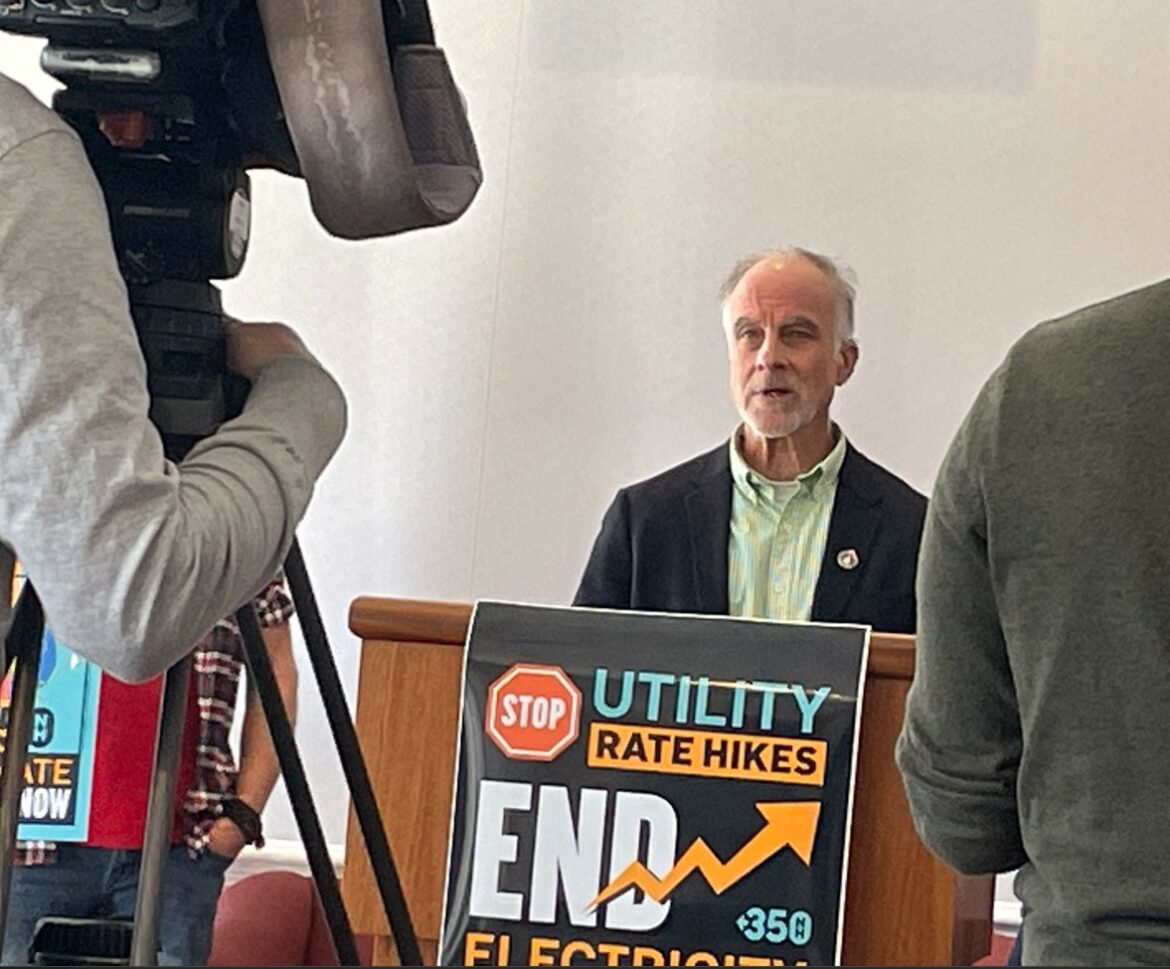By PAULA TRACY, InDepthNH.org
CONCORD – New Hampshire has a climate change denial problem and is behind its neighbors on renewable energy but there are some bright spots in proposed legislation, said state Rep. Tony Caplan, D-Henniker.
Caplan was among the speakers at a press conference Tuesday organized by 350NH to address utility rate hikes and continued struggles to get adequate emergency electricity funding out to residents.
The group called on Eversource, the state’s largest utility which makes a profit on distribution and is publicly regulated, to end rate hikes.
Officials at the company argue that the huge electric rate hikes last winter were a pass-through where they made no money on the energy.
In part, it is because the state has six-month contracts for the state’s three regulated utilities rather than long-range contracts which could offer some price stability over time.
The state may be headed toward allowing such long-term contracts in one of the bills Caplan sees as holding promise, Senate Bill 54.
Last winter’s spike was due to significant volatility in the market. War in the Ukraine and the fact the state is the farthest away from the least expensive source to make electricity, natural gas were some of the reasons.
Still, New Hampshire had the highest rate hikes in the region because, in part, the state has not invested in renewables, said 350NH supporters.
The hope of the organization is to prevent electricity rates from continuing their upward trend, halt electricity shut-offs.
The organization said the state did not adequately distribute rate relief to its residents.
A member of the House Science Energy and Technology Committee, Caplan said this winter’s electric spikes raised a question of the path the state is on and now there are some signs that it might not always be “the hole of the donut,” surrounded by states that are working on incorporating renewable energy into the state’s grid in a meaningful way, he said.
Caplan said the diversity of generation sources instead of just wind and solar are being considered and not necessarily what the Republicans favor. He said Senate Bill 166 relative to grid modernization and Senate Bill 54 related to purchase power agreements are “good news.”
He said while there has not been a lot of press on the first bill because it passed overwhelmingly, he said the public needs to make sure Gov. Chris Sununu signs the bill to modernize the grid and use smart grid technology.
The second sign of hope for New Hampshire’s renewable energy future is Senate Bill 54, he said.
This would allow for long-term purchase power agreements that favor renewable energy, he said.
A story about the bill is here https://indepthnh.org/2023/04/24/big-change-in-buying-power-contracts-being-advanced-in-nh-legislature/
It comes at a time when the state has a new law allowing municipalities to enter their own electric agreements and so far there are 34 towns, cities, and counties working on that option and more considering it.
“We have time to develop community power as alternatives,” Caplan said. “We don’t have time to play footsy with the climate.”
Emergency energy assistance funding stops on April 30, and hundreds of residents are still waiting for their applications to be processed.
While lawmakers made more than $30 million available last September for middle-class residents, only 1.5% of the funding was given out by the end of March.
Critics said the compromise from the governor’s more ambitious goal was flawed and difficult to access while supporters said the group targeted does not usually seek such financial help from the government.
The organization 350NH said with so many households unable to access this funding, some may be seeing electricity shut-offs from their utility companies this month.
“The state failed to distribute funding that so many people needed, so we are calling on them to prevent further shut-offs until assistance is justly distributed,” according to a 350NH statement.
The group noted Eversource announced $1.4 billion in profits in 2022.
Speaking at the event was North Country resident Jordan Applewhite and Portsmouth Resident and 350NH Youth Program Organizer Elisabeth Bialosky.
The group 350NH works to stop the climate crisis by building grassroots support for a just transition to renewable energy and an end to fossil fuel use and expansion, according to its website. It is an independent affiliate of 350.org National.





